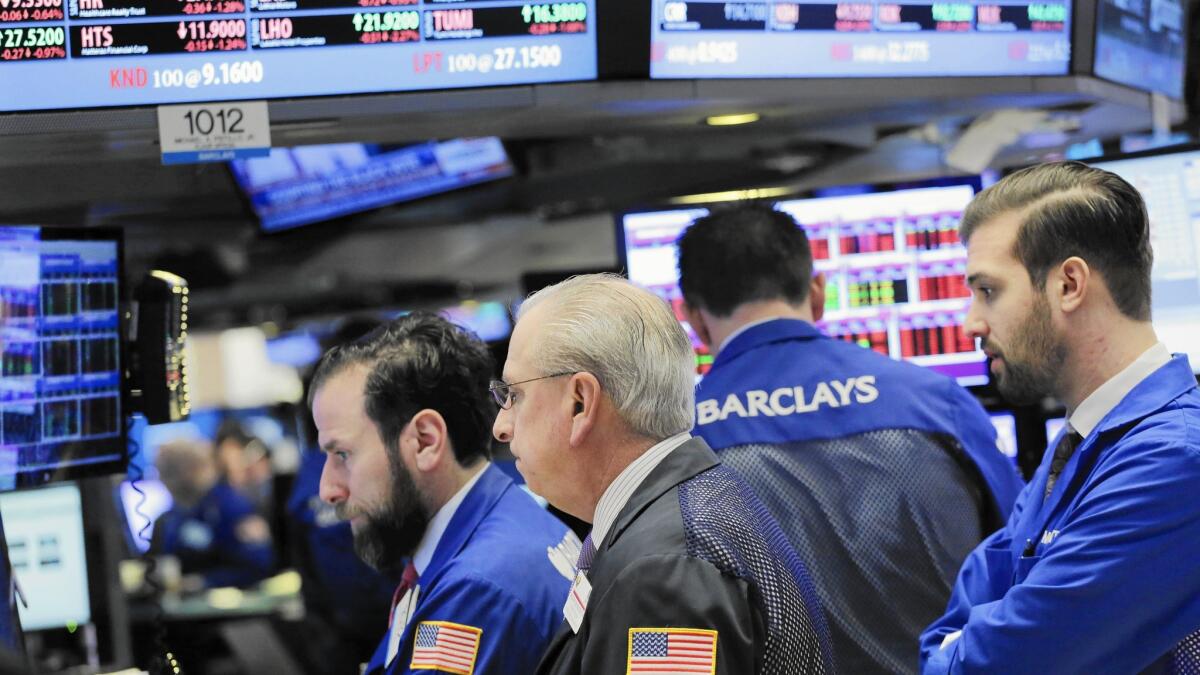Q&A: What a recession does to your money

- Share via
If we are in a recession — and we won’t know we’re in one until well after it’s begun — stocks probably still have a long way to go down.
The Standard & Poor’s 500 index has dropped more than 12% since peaking last summer, and it joined markets around the world in another slide last week. Worries are high that the sharp slowdown in China’s growth, falling U.S. corporate profits and other downward pressures will pull the economy back into a recession.
If a garden-variety one is on the way, the stock market’s drop isn’t even halfway done.
See more of our top stories on Facebook >>
Stocks have lost an average of 33% from top to bottom around past recessions going back to 1929, according to a review by strategists at Credit Suisse.
Investors are scared enough that they’re already pulling pages from the recession playbook. They’re moving into types of stocks and other investments that typically have held up best during past downturns and avoiding those that tend to get hit the worst.
The temptation to sell everything and get out of stocks can be costly, though. After every previous recession, stocks have eventually gone on to recover their losses — and then climb higher.
Every downturn is different, but a look at the numbers gives investors a sense of at least what’s possible. Here’s what they show:
How bad for stocks are recessions usually?
Bad, but not as bad as the last recession.
A drop of more than 20% should be expected, and most recessions have seen the S&P 500 fall at least that much. Including the 19.9% drop around the 1990-91 recession, it’s happened in 10 of the last 14.
The last recession was far more painful for investors, with its 57% plunge. But that happened when investors were questioning whether the financial system would even continue to exist, and it was far from typical. You have to go back to the Great Depression to find a bigger drop for stocks.
Which stocks tend to do worst?
Size matters. The smaller the company, the more its stock tends to fall during a recession. The Russell 2000 index of small-cap stocks has done worse than the S&P 500 index of large-cap stocks in each of the last five recessions.
A similar scenario is playing out now. The Russell 2000 has lost about 25% since peaking in June, double the S&P 500’s drop.
Which stocks tend to hold up best?
Even when the economy’s shrinking, people still buy food and diapers.
Because profits tend to stay steadier for companies that sell everyday items to consumers, so do their stock prices. That’s why investors lump them with healthcare and telecom stocks into a category known as defensive stocks.
They still fall during recessions but not as much as the rest of the market. Procter & Gamble Co. and other makers of consumer staples fell 31% around the Great Recession, roughly half the broad market’s loss.
What about other “safer” investments?
Bonds are a traditional comfort blanket for investors during downturns because they are less volatile than stocks and they generate regular income for investors. During the last recession, bonds helped to limit losses for investors with balanced portfolios, then helped them get back to even long before stock-only investors did.
The average intermediate-term bond mutual fund has returned 1.3% this year, through Wednesday.
Gold, another traditional landing spot for jittery investors, has also climbed this year.
Why might the playbook not work as well this time?
Investors scarred by the Great Recession have piled into relatively safe stocks in recent years, even while the economy was growing, in search of steadier returns. All that demand means they’re trading at higher prices relative to their earnings, and more expensive valuations mean these stocks may not offer as much protection as in past downturns.
As for bonds, their low yields mean they’re not producing as much income. That in turn means they can’t possibly provide as strong a cushion as in past recessions.
Gold, meanwhile, is up this year but has been on a general downward trend since summer 2011. Gold tends to do best when worries about inflation are growing. Many central banks around the world now see the opposite — a sustained cycle of falling prices, or deflation — as the bigger threat.
Why not sell stocks and just get out of the way?
It’s scary to watch the stock market plummet, but long-term investors have always eventually been made whole.
Someone with terrible timing who bought an S&P 500 index fund Oct. 9, 2007, when stocks peaked before the financial crisis, got back to even by August 2012, aided by dividends. That meant a wait of about five years.
Plus, much of stocks’ long-term returns can come from just a handful of really big days, and it’s impossible to predict when they’ll occur. Miss them and owning stocks gets much less lucrative. Two-thirds of the S&P 500’s gain over the last decade has come from just five days.
“This is the whole point of why equities generate the best returns of any major asset class over long periods of time,” said David Lefkowitz, senior equity strategist at UBS Wealth Management Americas. “They have higher volatility. If you can live with the higher volatility, you should be in a position to earn higher returns. I fully expect that stocks ultimately will reach new highs.”
MORE FROM BUSINESS
At this garage, people pay $116,500 for a parking spot
Apollo Global buying home security firm ADT for $6.94 billion
Lazarus: Obama’s budget plan would allow greater scrutiny of high drug prices
More to Read
Inside the business of entertainment
The Wide Shot brings you news, analysis and insights on everything from streaming wars to production — and what it all means for the future.
You may occasionally receive promotional content from the Los Angeles Times.










